
Professor Douglas Thompson talked this event and the impact it had on slavery throughout the Antebellum period.
- Subject:
- History
- U.S. History
- Material Type:
- Homework/Assignment
- Lecture
- Provider:
- C-SPAN
- Author:
- C-SPAN
- Date Added:
- 01/25/2023

Professor Douglas Thompson talked this event and the impact it had on slavery throughout the Antebellum period.
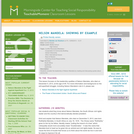
This lesson focuses on the leadership qualities of Nelson Mandela, South African civil rights leader and the country's first democratically elected president.

No Turning Back immerses young people in daily life under segregation and voter intimidation in the South during the 1960s. Playing as Verna Baker, a fictional teen from the Mississippi Delta, the player experiences and responds to racial restrictions and inequalities known as "Jim Crow," including limited access to education, health care, and voting rights. The TEACH page includes a wealth of materials to support the learning goals of the mission, including comprehension questions, writing prompts, vocabulary activities, and primary source analysis.
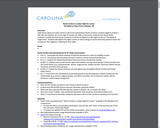
Little known about our state’s history is the brave confrontation North Carolina’s Lumbee staged to protest a KKK rally near Maxton, NC on the night of January 18, 1958. In this lesson, students learn about North Carolina’s Lumbee and their heroic resistance to hatred and bigotry on this night, known as “The Battle of Hayes Pond.” Students will explore the night’s events as well as design an active citizenship award to honor the Lumbee for their vigilance in fighting for their rights.
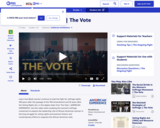
Learn how Black women continue to lead the fight for suffrage rights, 100 years after the passage of the 19th Amendment and 55 years after the Voting Rights Act, in this digital video from The Vote | AMERICAN EXPERIENCE. Use this video when studying the women’s suffrage movement to explore the leadership role of African American women in the long struggle for voting rights and examine historic and contemporary efforts to suppress the African American vote.
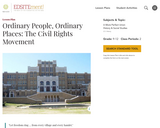
By researching these "ordinary" people and the now historic places where they brought about change, students will discover how the simple act of sitting at a lunch counter in North Carolina could be considered revolutionary, and how, combined with countless other acts of nonviolent protest across the nation, it could lead to major legislation in the area of civil rights for African Americans.
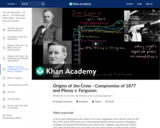
Federal troops left the South after the Compromise of 1877, ending Reconstruction. The Supreme Court ruled that segregation did not violate the Fourteenth Amendment in the Plessy v. Ferguson decision of 1896.
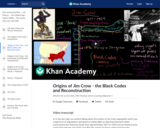
In the period after the Civil War in the American South, when Southern society reorganized to account for the end of slavery. In this video, Kim discusses how many Southern governments passed laws preventing African Americans from voting, among other things, which prompted Congress to pass the Fourteenth Amendment.
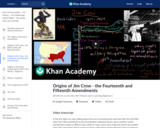
During Reconstruction, federal troops attempted to enforce the Fourteenth and Fifteenth Amendments in the South.
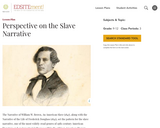
Trace the elements of history, literature, polemic, and autobiography in the 1847 Narrative of William W. Brown, An American Slave.
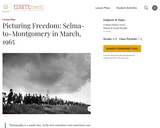
After analyzing photojournalist James Karales's iconic photograph of the march, reading background material on it, and considering what the marchers might have thought and felt, students write and illustrate a postcard describing this civil rights event from a marcher's viewpoint.
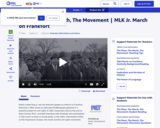
Martin Luther King Jr. was the featured speaker at a March on Frankfort, Kentucky in 1964, where an estimated 10,000 people gathered in a peaceful protest for civil rights. In 2022, researchers Joanna Hay and Le Datta Grimes, Ph.D., recorded interviews with 10 people who participated in that march as teens or young adults. In this video, interviewees reflect on the importance of place, the march and the civil rights movement.

Plessy v. Ferguson was an 1896 Supreme Court case concerning whether "separate but equal" railway cars for black and white Americans violated the equal protection clause of the Fourteenth Amendment. In this video, Kim discusses the case with scholars Jamal Greene and Earl Maltz.
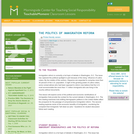
Students explore how the growing power of Latino voters improves chances for comprehensive immigration reform and consider some of the economic benefits of immigration.

Students will complete an IDM (Inquiry Design Model) Lesson to guide them through the social and political discrimination, segregation, and violence against African Americans during the “Jim Crow Era.” They will evaluate the effectiveness of the Reconstruction Amendments based on three supporting questions that help guide them to constructing and providing evidence for a final argument that addresses the compelling question.
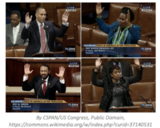
In this project, you will explore a real-world problem, and then work through a series of steps to analyze that problem, research ways the problem could be solved, then propose a possible solution to that problem. Often, there are no specific right or wrong solutions, but sometimes one particular solution may be better than others. The key is making sure you fully understand the problem, have researched some possible solutions, and have proposed the solution that you can support with information / evidence.Begin by reading the problem statement in Step 1. Take the time to review all the information provided in the statement, including exploring the websites, videos and / or articles that are linked. Then work on steps 2 through 8 to complete this problem-based learning experience.This project will address the following:Habits of Mind: Thinking flexiblyCritical Thinking Skills: Analyze/evaluate

During the World War Two years, a series of groundbreaking radio programs tried to mend the deep racial and ethnic divisions that threatened America. At a time when blacks were usually shown on the radio as lazy buffoons, the federal government and civil rights activists used radio for a counter attack. Did radio unify America in the face of war? This is "Radio Fights Jim Crow".
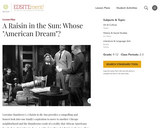
Lorraine Hansberry's A Raisin in the Sun provides a compelling and honest look into one family's aspirations to move to another Chicago neighborhood and the thunderous crash of a reality that raises questions about for whom the "American Dream" is accessible.

This lesson focuses on early Asian immigrants to the United States, their reasons for immigration, successes they experienced, challenges they faced, and the changing reception they received in their host country. Students will learn what an immigrant is, what it means to be an “American, what the American Dream is, and how primary sources and secondary sources provide varied perspectives that inform a deeper understanding of an event.
2021 Social Science Standards Integrated with Ethnic Studies:
Civics and Government: K.1, 3.2, 5.1
Historical Knowledge: 2.16, 5.22
Historical Thinking: K.17, K.18, 2.22
Social Science Analysis: 1.19, 1.21, 3.18, 3.19, 4.24, 5.27

That Jim Crow was a tremendously important period in United States history is undisputable. Less obvious is how to properly address the violence, politics, and complexities that mark the era. This site looks at the century of segregation following the Civil War (1863-1954). Jim Crow, a name taken from a popular 19th-century minstrel song, came to personify government-sanctioned racial oppression and segregation in the U.S. This website describes pivotal developments during that time дус the Emancipation Proclamation, the Compromise of 1877, the Brown v. Board of Education decision, and others.